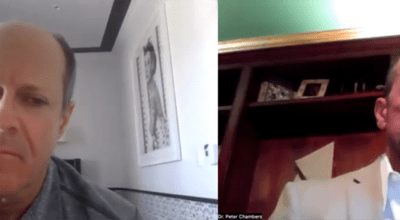
I am waiting for the court of appeals to rule against state of Tennessee and her people in our case — and against me personally. I am not expecting relief nor a writ of mandamus to compel the governor to obey the communicable disease law he violated in 2020.
By David Tulis / NoogaRadio 96.9 FM
CHATTANOOGA, Tenn., Monday, March 28, 2022 – The state constitution is the covenant document representing the agreement between the people and the government, and shows its vitality in times of threat, crisis, danger and temptation.
In ordinary times, when peace reigns and the people of Tennessee live out their lives, with family, business, church, private association, the constitution operates in a “sleep” or “screen saver” mode. It regulates the normal function of the relation between the three branches (judicial, executive, legislative) and occasionally is consulted, usually by judges writing about the law in opinions.
But the constitution, as a safeguard, lies quietly with little attention or regard. It’s intended to serve not in times of peace and tranquility, but in times of thit’s of despair conflict and the temptation for tyranny –as in these times.
Crisis mode, words of iron
The constitution is important, and its provisions stand like iron, when threat comes upon the people and their government.
Crisis is a term describing a problem, hazard, risk, peril that in some way invites the state or the government to harm or injure the people in their rights by some law, policy, action, or directive. The crisis is one that draws the governor, or a commissioner, or a part of government to consider an “initiative” or program that offends the people by directing state resources to “solve” the problem besetting the state and the people.
For two years — for 745 days — Tennessee has been under a state of emergency or recovering from it. Gov. Bill Lee let the emergency expire Nov. 19, 2021. The emergency was created fraudulently, illegally, and in violation of the constitutional separation of powers.
Gov. Lee refused to obey the primary communicable disease law at T.C.A. § 68-5-104, which – had he obeyed the law – would have given him effectively a “probable cause” for the arrest of the Tennessee economy and all the people of the state. His “safer at home” order April 2 was a penal remedy, a mass home detention and home confinement Without any warrants, and improperly directed not upon men and women individually, but upon the mass of the people. His refusal to obey state law effectively denies him the basis for his state of emergency at T.C.A. Title 58.
He was like the cop who makes an arrest of a citizen without probable cause, an arrest warrant, a copy of an indictment – and arrest without a “nonfraudulent exigency,” to use language in my suit vs. the governor.
The constitution’s role comes into view in cases such as the erstwhile Covid-19 “pandemic.”
The constitution was not consulted. Attorney general Herbert Slatery III did not carefully consider it in advising the governor. The state’s chief lawyer didn’t review, even more significantly, the statute controlling what is to happen in a “health crisis.”
The law requires, in short, a “determination” be made as to the agent of contagion. That essential medical work, required by law, was not done. Before I filed suit, I determined that not a single sticky note exists to show that the authorities charged with “protecting” the people had acted to obey the law. There were no meeting minutes, no emails, no policy drafts, no statements, no Q&A among officials about the law – nothing exists to show that anyone in government gave a hoot about obeying the law. The took guidance from CDC, but not the TCA.
The breaches in the constitution came BECAUSE OF the violations of the statute. Breach of duty under law caused breach of myriad constitutional rights.
When temptation is great
Respect for the constitution and art. 1 bill of rights should have compelled Gov. Lee, his commissioner Lisa Piercy and the staff to earnestly study that law, as I did reporting on the crisis. If I could read the law, so could they.
Constitutions matter when the temptation is great to depart from due process, to depart from the operation of law upon the agencies that are subject of the law. State law regulates executive branch agencies; the Tennessee code binds them, and the commissioners at the top.
If officials refuse their duty to obey, the people have no remedy and no redress. In the case of the CV-19 fraud, I had to sue for writ of mandamus to compel obedience to the law, not having any remedy to bring government back under the law.
My strongly negative commentary about mayoral candidates in Hamilton County in the Republican party arises from their slight care for the constitutional rights of the people. They may like voters, residents and county folk personally. They may remember names, occupations and situations of people they meet on the campaign trail, and express warm and genuine care for them. At a fundraiser, the candidate is among paying and hopeful friends.
But do they like them constitutionally? Do they like them through the constitutional grid, which posits that sovereignty resides in them? The Tennessee constitution bill of rights makes this claim, ”That all power is inherent in the people.”
Now, this claim about the sovereignty of the people is a theological error, a Scottish rationalist claim aligned with the work of Jean-Jacques Rousseau and his idea of the general will. The claim is that sovereignty resides – not with God – but with man, the collective.
The American republic was founded in a coup d‘etat in 1787 in Philadelphia which sought to raise the role of man, and dethrone the prospect that God is sovereign. According to the Conspiracy in Philadelphia (2004) by Dr. Gary North, the pact at the secret convention created the first-ever human-based government. Madison and the other fathers, as we call them, created a completely new form of government by eliminating the Christian oath and putting up “the people” as the deity and the sovereign.
Dr. North indicates that our country has devolved inexorably toward a unitary state with a humanist and materialist internal drive toward consistency, toward centralization and breathtaking scale in its programs and pretenses, all under state and federal constitutions. Toward totalitarianism and national socialism, in other words.
We see how officeholders reject “the people” and reject the “limits” imposed on their offices by constitutions U.S. and state. We have little hope in restoring lost rights under any constitution, though it is our duty to continue to appeal under man’s law, such as it is, and more so under God’s law, which is to say the case law of the Old Testament. Since the 1970s, the Christian reconstructionists have developed this study of the law of God, with no substantive opposition.



When the Articles of Confederation were discarded the union of States were plunged into Bolshevism.